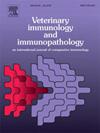优化泽西犊牛呼吸道疫苗接种策略:接种时机和母体抗体干扰的影响
IF 1.4
3区 农林科学
Q4 IMMUNOLOGY
引用次数: 0
摘要
牛呼吸道疾病(BRD)对养牛业构成了重大挑战,因为它造成了巨大的经济损失并对动物福利产生了不利影响。本研究旨在考虑年龄相关反应和母体抗体干扰,确定泽西犊牛呼吸道疫苗接种的最佳时机。25头泽西犊牛按接种时间随机分为3组:A组(14和16周)、B组(16和18周)和C组(18和20周)。根据犊牛最初的传染性牛鼻气管炎(IBR)抗体水平进一步分为亚组。在8、14、24和52周龄采集血液样本,测定IBR和牛病毒性腹泻(BVD)抗体水平。结果表明,考虑接种时母体IBR抗体水平的疫苗接种策略增强了长期IBR免疫,并影响了BVD免疫。此外,在血清IBR阴性时接种的小牛在52周时的血清阳性表现高于血清阳性时接种的小牛。我们的研究结果表明,泽西小牛的最佳接种策略是在14至18周龄之间进行初次接种,然后每隔两周进行一次加强接种。此外,接种疫苗时母体抗ibr抗体水平较低与52周龄时抗体水平升高相关,并可能影响BVD免疫。这些发现可以为泽西牛制定更有效的疫苗接种策略提供信息,有可能加强BRD管理并减少对该品种的经济影响。本文章由计算机程序翻译,如有差异,请以英文原文为准。
Optimizing Respiratory Vaccination Strategies for Jersey Calves: Impact of Timing and Maternal Antibody Interference
Bovine Respiratory Disease (BRD) poses a significant challenge to the cattle industry, as it causes substantial economic losses and adverse impacts on animal welfare. This study aimed to determine the optimal timing for respiratory vaccination in Jersey calves, considering age-related responses and maternal antibody interference. Twenty-five Jersey calves were randomly assigned to three vaccination groups based on timing: Group A (14 and 16 weeks), Group B (16 and 18 weeks), and Group C (18 and 20 weeks). Calves were further divided into subgroups based on their initial Infectious Bovine Rhinotracheitis (IBR) antibody levels. Blood samples were collected at 8, 14, 24, and 52 weeks of age to measure IBR and Bovine Viral Diarrhea (BVD) antibody levels.
The results indicated that the vaccination strategy, which considered maternal IBR antibody levels at the time of vaccination, enhanced long-term IBR immunity and influenced BVD immunity. Additionally, calves vaccinated while seronegative for IBR exhibited higher seropositivity at 52 weeks compared to those immunized while seropositive.
Our findings suggest that the optimal vaccination strategy for Jersey calves involves primary vaccination between 14 and 18 weeks of age, followed by a booster shot at a two-week interval. Furthermore, low maternal anti-IBR antibody levels at the time of vaccination were associated with increased antibody levels at 52 weeks of age and may influence BVD immunity. These findings could inform the development of more effective vaccination strategies for Jersey calves, potentially enhancing BRD management and reducing the economic impact on this breed.
求助全文
通过发布文献求助,成功后即可免费获取论文全文。
去求助
来源期刊
CiteScore
3.40
自引率
5.60%
发文量
79
审稿时长
70 days
期刊介绍:
The journal reports basic, comparative and clinical immunology as they pertain to the animal species designated here: livestock, poultry, and fish species that are major food animals and companion animals such as cats, dogs, horses and camels, and wildlife species that act as reservoirs for food, companion or human infectious diseases, or as models for human disease.
Rodent models of infectious diseases that are of importance in the animal species indicated above,when the disease requires a level of containment that is not readily available for larger animal experimentation (ABSL3), will be considered. Papers on rabbits, lizards, guinea pigs, badgers, armadillos, elephants, antelope, and buffalo will be reviewed if the research advances our fundamental understanding of immunology, or if they act as a reservoir of infectious disease for the primary animal species designated above, or for humans. Manuscripts employing other species will be reviewed if justified as fitting into the categories above.
The following topics are appropriate: biology of cells and mechanisms of the immune system, immunochemistry, immunodeficiencies, immunodiagnosis, immunogenetics, immunopathology, immunology of infectious disease and tumors, immunoprophylaxis including vaccine development and delivery, immunological aspects of pregnancy including passive immunity, autoimmuity, neuroimmunology, and transplanatation immunology. Manuscripts that describe new genes and development of tools such as monoclonal antibodies are also of interest when part of a larger biological study. Studies employing extracts or constituents (plant extracts, feed additives or microbiome) must be sufficiently defined to be reproduced in other laboratories and also provide evidence for possible mechanisms and not simply show an effect on the immune system.

 求助内容:
求助内容: 应助结果提醒方式:
应助结果提醒方式:


